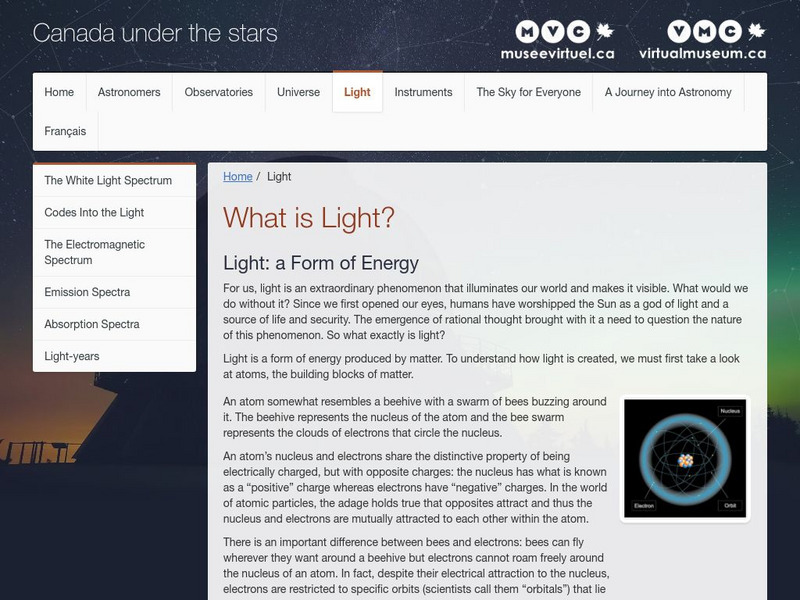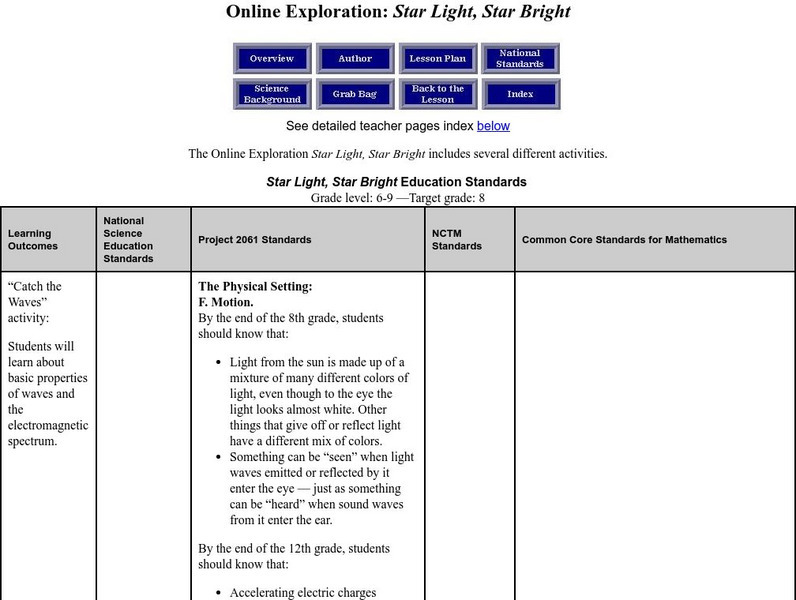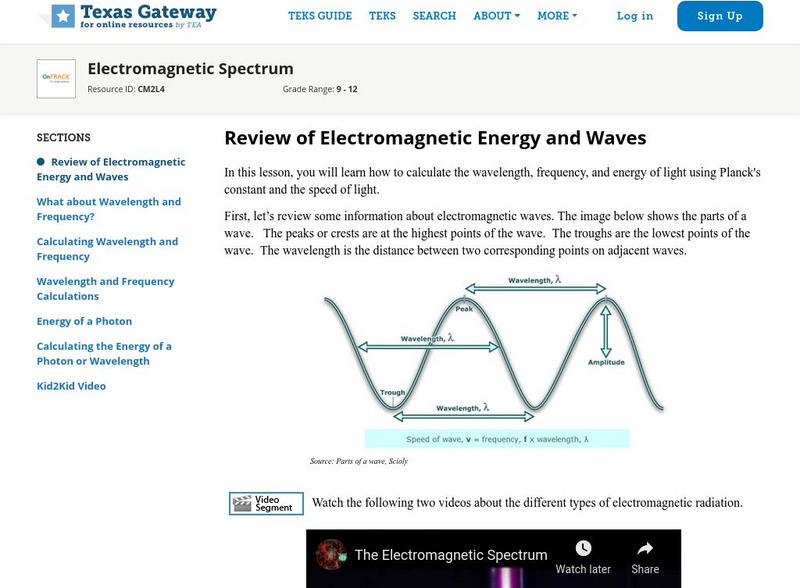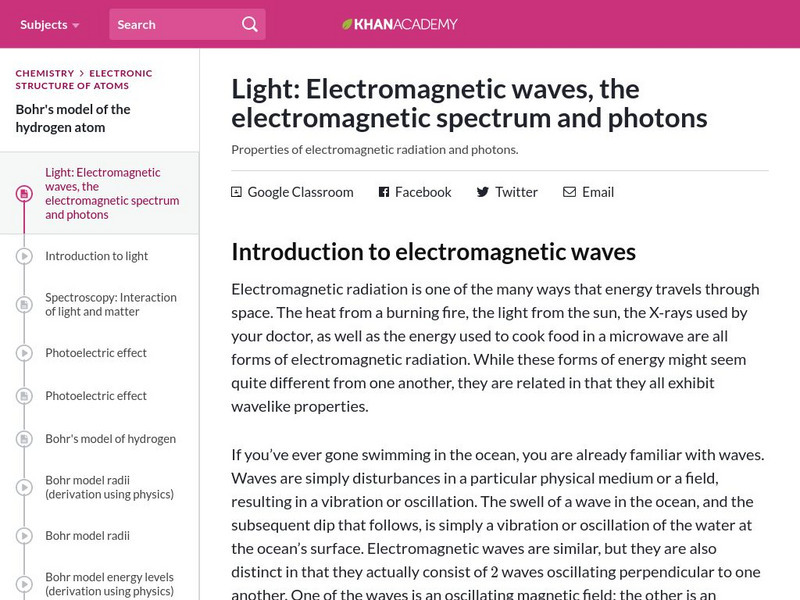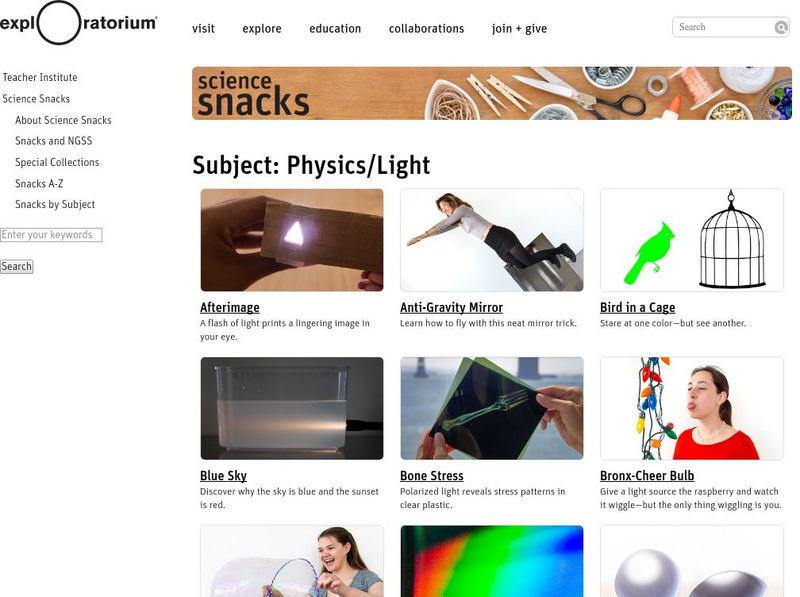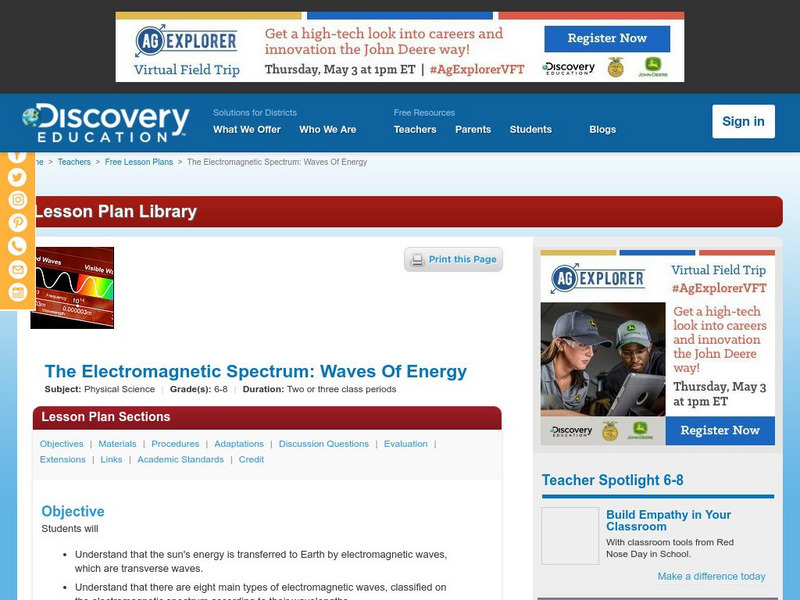Curated OER
Observing Bursts from an X-ray Burster
Students study the use of X-ray data to make size and energy estimates of the source and the processes occurring there. They use XTE observations of the object GRO 1744-28 to determine whether bursts occur periodically and the duration...
Curated OER
Solar
Students study solar energy. In this renewable energy lesson students complete several lab activities using different controls and variables.
Curated OER
Clouds as Art: Torn Paper Landscape
Students create a torn paper landscape and use it to study clouds. In this cloud study and art lesson, students make a background art image from torn paper. Students create a torn paper landscape and use cotton balls to illustrate...
Ducksters
Ducksters: Physics for Kids: Light Spectrum
Kids learn about the science of the light spectrum. Wavelengths and frequencies of the electromagnetic waves including visible light, primary colors, and subtractive colors.
Ducksters
Ducksters: Kids Science Projects and Experiments: Light Spectrum
Kids learn by experimenting with science. Project about the light spectrum.
Other
Vmc: What Is Light?
What is light? A detailed examination of what creates light, light spectrums, scientists' discoveries, and colored graphics. Appropriate for the older student or adult researcher.
NASA
Nasa: Tour of the Electromagnetic Spectrum: Visible Light
Visible light waves are the only electromagnetic waves we can see. We see these waves as the colors of the rainbow. Each color has a different wavelength. Red has the longest wavelength and violet has the shortest wavelength. When all...
Lawrence Berkeley National Laboratory
Berkeley Lab: Micro Worlds Project: Advanced Light Source
A discussion of the Advanced Light Source (ALS) facility and its use in material analysis and medicine.
University of Colorado
University of Colorado: Physics 2000: Quantum Atom
Several pages with an interesting discussion of the visible light spectrum and atomic absorption and emission line spectrum. Features excellent graphics, thorough and understandable discussion, and many interactive Java applets.
South Carolina Educational Television
Etv: Nasa Online: Light: Scattering Light
An introduction to the concept of the visible light spectrum provided in an animated format.
University of Colorado
University of Colorado: Ph Et Interactive Simulations: Blackbody Spectrum
How does the blackbody spectrum of the sun compare to visible light? Learn about the blackbody spectrum of the sun, a light bulb, an oven, and the earth. Adjust the temperature to see the wavelength and intensity of the spectrum change....
University of Colorado
University of Colorado: Ph Et Interactive Simulations: Blackbody Spectrum
An interactive simulation that teaches about blackbody, sun, light, and quantum mechanics. Students learn my making observations while changing the temperature with a sun, a light bulb, an oven, and the Earth in order to see the changes...
Space Telescope Science Institute
Amazing Space: Star Light, Star Bright
This online exploration provides an opportunity to identify the different properties of waves and the relationship that exists between energy, wavelength, and frequency. Correlate images from the Hubble Telescope to the wavelength,...
PBS
Pbs Learning Media: The Electromagnetic Spectrum: Frontline
This video segment adapted from FRONTLINE introduces the electromagnetic spectrum and explains how the various types of electromagnetic waves are distinguished by the amount of energy each wave carries.
Texas Education Agency
Texas Gateway: Electromagnetic Spectrum
This tutorial explores using Planck's constant and the speed of light to calculate the wavelength, frequency, and energy of light.
Khan Academy
Khan Academy: Electromagnetic Waves: The Electromagnetic Spectrum and Photons
An article that discusses the coupling of an electric field with a magnetic field to create electromagnetic waves. Article also discusses how different types of electromagnetic waves have different wavelengths which forms the...
Canada Science and Technology Museum
Canada Science and Technology Museum: Background Information for Light
Light! How do we see? What makes light? Find out everything you need to know through the Q&As on this site.
Khan Academy
Khan Academy: Light and Photosynthetic Pigments
What is light energy? Here we'll learn about the properties of light and how pigments such as chlorophylls absorb light energy.
Exploratorium
Exploratorium: Science Snacks: Physics/light
Here is a large collection of simple science class activities for understanding the physics of light.
Physics Classroom
The Physics Classroom: Light Waves and Color
The behavior of light waves is introduced and discussed. Also, polarization, color, diffraction, and interference are introduced and discussed thoroughly as supporting evidence of the wave nature of light.
Discovery Education
Discovery Education: The Em Spectrum: Waves of Energy
Students are introduced to the electromagnetic spectrum through this group research activity. Each group investigates a different wavelength range within the em spectrum and reports back to class. Discussion ideas also included.
Other
Fluorescent Mineral Society: The Ultraviolet Spectrum
This resource presents a discussion of the nature and properties of ultraviolet light. The manner in which minerals emit UV light is described and explained.
Science Struck
Science Struck: Wavelength of Visible Light Spectrum
Explains where visible light fits into the electromagnetic spectrum and the wavelengths for the different colors we see.
TeachEngineering
Teach Engineering: Exploring the Electromagnetic Spectrum
Students learn the basics of the electromagnetic spectrum and how various types of electromagnetic waves are related in terms of wavelength and energy. In addition, they are introduced to the various types of waves that make up the...
Other popular searches
- Visible Light Spectrum
- Light Spectrum Stars
- Light Spectrum Waves
- Light Spectrum Activity
- Light Spectrum and Colors
- Light Spectrum and Waves
- Newton's Light Spectrum
- Light Spectrum \ Stars
- Spectrum of Light
- Spectrum Light







